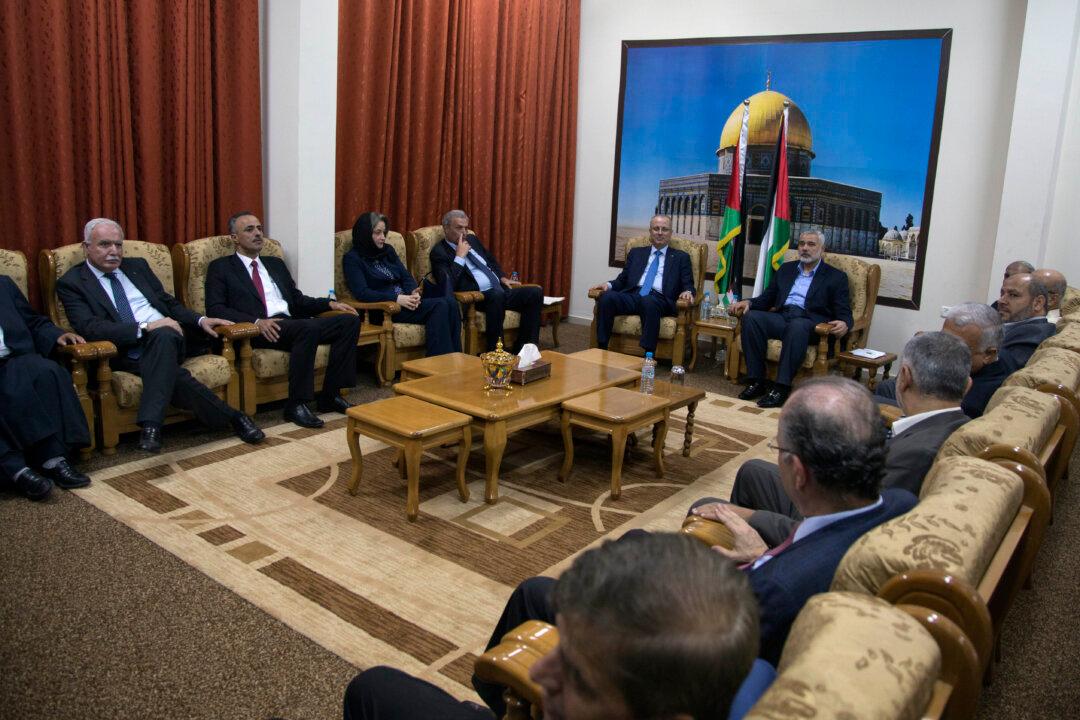GAZA CITY, Gaza Strip—The new Palestinian unity government toured Gaza and held a Cabinet meeting there for the first time Thursday, aiming to assure donor countries that absolute Hamas control has ended and that it can lead the rebuilding of the war-battered territory.
The visit by the ministers came three days before an international pledging conference for Gaza, to be held in Cairo.
In establishing a foothold in Gaza, the new Cabinet, which reports to Western-backed President Mahmoud Abbas, was trying to signal that the Palestinians’ paralyzing political split has come to an end. Hamas had seized Gaza from Abbas in 2007, leaving him with only parts of the West Bank.
Still, the situation remains volatile. Hamas refuses to disband its security forces, even though it promises to support the new government of independent experts.
[aolvideo src=“http://pshared.5min.com/Scripts/PlayerSeed.js?sid=1759&width=480&height=300&playList=518455354&responsive=false”]
Those security forces were in full view Thursday as the ministers inspected neighborhoods that were badly damaged in this summer’s 50-day war between Israel and Hamas.
In the Gaza City neighborhood of Shijaiyeh, Hamas troops linked arms at one point to try to shield the Cabinet ministers — largely unsuccessfully — from a crush of curious onlookers.
The chaotic scene illustrated how fragile security arrangements are under a reconciliation deal reached by Abbas and Hamas earlier this year. Forces loyal to Abbas are to take up positions near Gaza’s border with Israel, including crossing points, to facilitate the import of construction materials, but Hamas troops would likely remain in control elsewhere in the territory.
Despite the uncertainty, the former political rivals said rebuilding is a shared priority. More than 60,000 homes and more than 5,000 businesses were damaged or destroyed during the war, according to estimates by the United Nations and the Palestinian government.
At the start of their visit, the Cabinet ministers, most from the West Bank, toured destroyed areas, including in the town of Beit Hanoun.
“What we have seen today is horrible,” Prime Minister Rami Hamdallah said at the start of theCabinet meeting in Abbas’ former residence. “I cried in Beit Hanoun when I saw how the people live and sleep. The priority is reconstruction” and political unification, he said.
Later, Hamdallah and his ministers visited Ismail Haniyeh, the top Hamas leader in Gaza. Haniyeh’s house was destroyed by an Israeli airstrike in the recent war and he received the group in a building next to the debris.
Haniyeh said that the Cabinet’s visit signaled “the end of the (political) split and sends a message to the Palestinian people and the world that we have one government and one political system.”
Haniyeh had served as prime minister for both the West Bank and Gaza after Hamas won parliament elections in 2006. He was fired by Abbas a year later, after Hamas seized Gaza by force. The takeover triggered a border blockade of Gaza by neighboring Israel and Egypt, and over the years, repeated reconciliation attempts failed.
Hamas became increasingly unable to govern in Gaza as a result of new Egyptian border restrictions last year that drove it into its worst financial crisis since its founding in 1987.
Earlier this year, a desperate Hamas agreed to hand over some authority to an Abbas-led unitygovernment. The new government was formed four months ago to replace rival administrations — one led by Hamas in Gaza and the other headed by Abbas in parts of the West Bank. However, it hadn’t operated in Gaza until now because of unresolved disputes between the long-time rivals and because of the war.
Palestinian unity is a consensus issue, with polls consistently showing a majority in favor of ending the political split.
In Gaza, many hope the new government will be able to ease border restrictions and revive the crippled economy.
“We hope they open the crossings and create jobs for young people,” said Mahmoud Sharif, 28, who sells cigarettes by the piece from a tray in a Gaza park. Sharif said he used to make a decent wage in a sewing workshop producing for the Israeli market before the border closure.
Israel initially refused to deal with the unity government because it is backed by Hamas. Since the Gaza war, Israel has signaled readiness to work with the Palestinian Cabinet, particularly onGaza reconstruction.
In a show of good will, Israel opened its Erez crossing into Gaza for the West Bank-based ministers on Thursday even though the crossing was meant to be closed for a Jewish holiday.
The shift came after the international community, including the U.S., agreed to work with the new government on rebuilding Gaza.
“The only way to have a long-term sustainable solution for Gaza is for the Palestinian Authority to assume full authority in Gaza,” U.S. State Department spokeswoman Jen Psaki told reporters in Washington on Thursday.
“So we support this interim technocratic government in its efforts and we view this meeting as a positive step in that direction.”
As part of the access restrictions on Gaza, Israel has prevented the import of construction materials, with the exception of shipments for projects supervised by international agencies, including the United Nations.
Israel fears Hamas will divert cement and steel for military use, including attack tunnels. Israel spotted and destroyed more than 30 such tunnels during the recent Gaza war.
Under a U.N.-brokered reconstruction deal, Israel is to ease the import of building materials, while U.N. inspectors and forces loyal to Abbas are to monitor the shipments until their final destination.
From The Associated Press. AP writer Matthew Lee in Washington contributed to this report.


